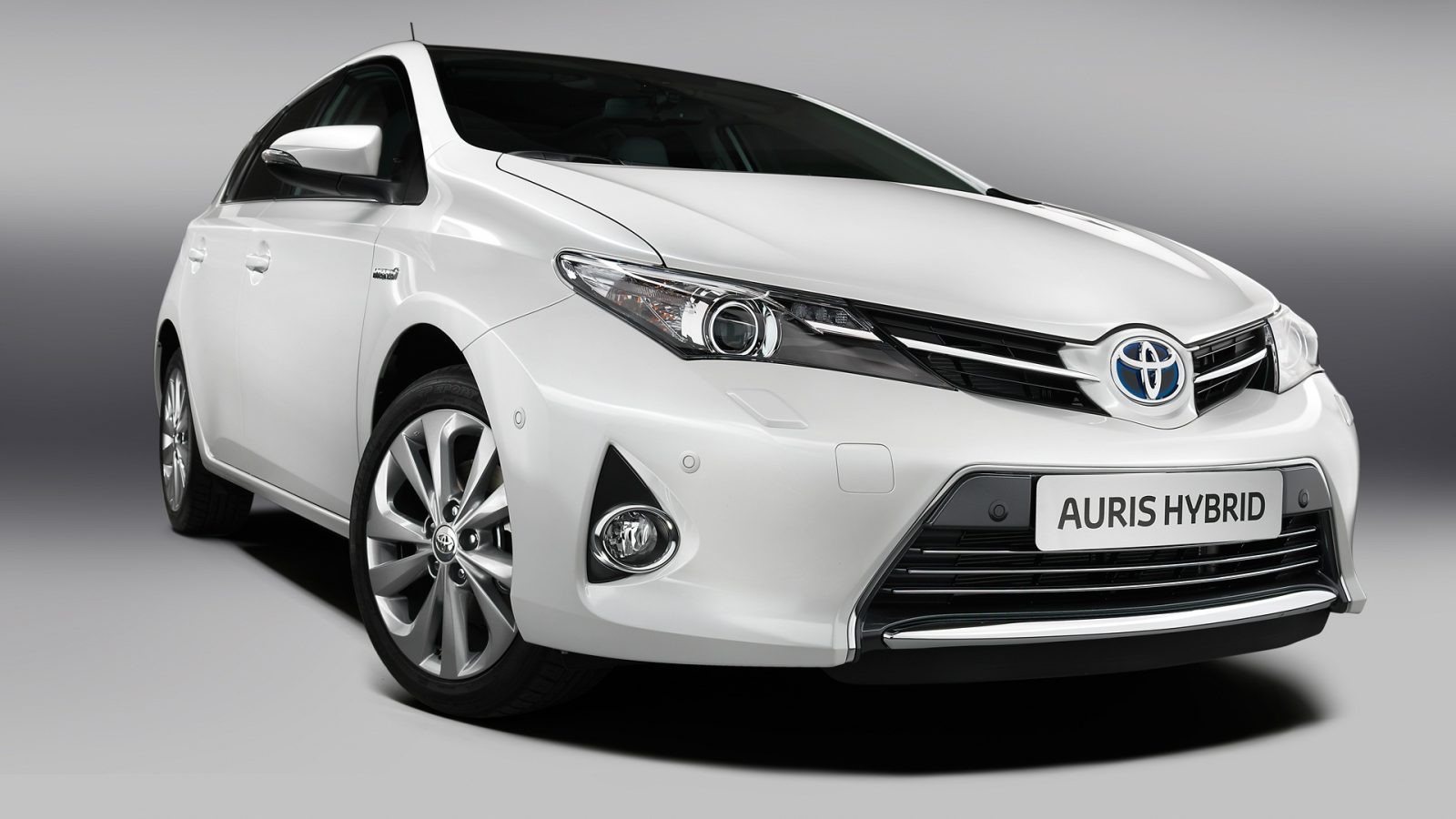As part of Toyota’s rigorous quality control programme, we have investigated the cause of a 12 volt flat battery issue that has left some Toyota Auris drivers unable to start their cars after only a short period without use, usually a couple of days.
We would like to apologise for any disappointment and inconvenience that may have occurred as a result of this issue. But we can now confirm that the cause has been identified and a permanent solution developed.
The following information only applies to any Toyota Auris (including Hybrid) produced between December 2012 and February 2014. If you have an Auris produced after February 2014 your vehicle is not affected by this issue. No other models are involved.
Toyota Auris Hybrid Flat Battery: What causes the issue?
The issue is caused when the hazard switch is partially depressed for a very short period of time, incorrectly activating the car’s CAN-bus electrical communications system. This draws a constant flow of current that can discharge the 12 volt battery if the car is left unused for several days.
How can I prevent this from occurring?
Toyota has published a Technical Service Bulletin to its dealer network advising them of a permanent solution to this issue. The bulletin contains information and software files that will enable technicians to modify the software of the car’s combination meter. This update will prevent the incorrect activation of the CAN-bus system and prevent any potential flat battery concerns arising from this area of the vehicle.
If you still have concerns regarding the 12 volt battery of your current generation Toyota Auris then we recommend you get in touch with your nearest Toyota dealer for further assistance. http://www.toyota.co.uk/find-a-dealer





I took my 66 plate Auris to my Toyota Dealer on Monday – well to be exact the AA took it as it wouldn’t even jump-start. (We had been away for 9 weeks) It is now Friday and they still can’t get it fixed. Don’t have a lot of faith in Toyota Service Centres!
Morning Michael,
We’re sorry to hear this.
Hopefully your Auris is now back on the road but if you wish to speak to our Customer Relations Team, their contact details can be found here: https://www.toyota.co.uk/help-centre/complaints-and-feedback
Thank you.
This is Getting Ridiculous Now and having owed Only Toyota and singing their praises for 35 years, a very disappointing situation.
The replies from Toyota, Say, Take it to Your dealer, they can check it out.
The Dealer can DO NOTHING besides a health check, this a is NOT a Dealer Fix, it is now an Endemic Problem that should be addressed, either by fitting a better 12 Volt battery or providing a Free Solar panel or trickle charger or Booster Jump Starter .
When going on holiday, we charge the 12 volt battery for 8 hours. After two weeks away the car starts fine,
Two days later we go for 20 mile drive, No Problems, Next day try to go to the shops, car won’t start battery is dead, Get out the booster pack IN THE RAIN
Good morning Philip.
We’re sorry to hear you’re experiencing problems with the battery. All modern cars drain the 12v battery when they are switched off. This is due to the onboard electrical systems. If the 12v battery is not given a chance to recharge often enough, it will go flat. Read more here and pick up some tips that, if followed, can help ensure your Toyota remains in tip-top condition during an extended layoff: https://brnw.ch/21wDfeR
If you would like your car to be inspected, or to run through recommended options, please get in touch with your local Toyota Centre.
Thank you.
I have a 2018 hybrid auris which has the same problem with the 12v battery draining when not used for a few days?
Hi Stef,
We’re sorry to hear you’re experiencing problems with the battery. All modern cars drain the 12v battery when they are switched off. This is due to the onboard electrical systems. If the 12v battery is not given a chance to recharge often enough, it will go flat. Read more here and pick up some tips that, if followed, can help ensure your Toyota remains in tip-top condition during an extended layoff: https://brnw.ch/21wDfeR
If you would like your car to be inspected, or to run through recommended options, please get in touch with your local Toyota Centre.
Thank you.
Hello
My mother’s Toyota Auris on a 2013 registration has started recently to have battery drain issues. We took it to the dealer who have done a discharge test on the battery and found that it is in good order. The came to the conclusion that because my mother does not use the vehicle much, then that is the issue. I questioned them on the issue reported above about battery drain and the software update and they denied that they have recieved this from Toyota and that it is not the problem. So I’m in the position that either the above article is incorrect or the dealer is. Can you please tell me the date and time Toyota published the technical services bulletin to the dealers and also the technical service bulletin number so I can point my very unhelpful dealer in the right direction. If the issues of the battery drain, in as little as 2 days even when fully charged persist with no pathway to solution then the only way we will resolve this issue is to sell the car. If this is the case we will not be buying another Toyota
Hello Neil,
Thank you for your comment. We are unable to confirm any information regarding the technical services bulletin.
We are attentive to the situation which you have highlighted. To provide a bit of reassurance, less than 1% of our entire customer base encounters issues with their 12 volt Battery. All modern cars drain the 12v battery when they are switched off. This is due to the onboard electrical systems. If the 12v battery is not given a chance to recharge often enough, it will go flat.
We pride ourselves on performance and reliability so to ensure there is a continuation and we live up to our own standards, we have introduced a higher performance battery for some of our models if and when needed.
If you have any further questions, please do not hesitate to ask.
Many thanks,
Toyota UK
Why can’t you tell about the technical service bulletin. I understand about battery drain and vehicles that are not used regularly. There has been no change of use with this vehicle for 10 years but the battery drain only started to happen in the last couple of years.A new battery has been fitted and tested by Toyota and a AA call out also confirmed the battery was healthy. We have charged the battery on the car to full and then left it on the drive and not used it and found it has gone flat in little as 2days. Would Toyota design a car with a battery drain so large that you could not leave it for 2 days?. My Mother bought this car new and it has been serviced only by Toyota, I’m would appreciate a better response to the said questions for someone who has been a loyal customer to you, than to say you are unable to confirm about service bulletins . Toyota wrote this blog and so are fully aware of the issue. If you would like to discuss this privately, then please send me your details. The other option is to sell the car and buy another car and it will not be another Toyota.
Good morning Neil.
We apologise for the disappointment and inconvenience caused.
If you would like your car to be inspected again and to discuss this further, we’d kindly recommend getting in touch with your local Toyota Centre.
Thank you.
Hello sir, I live in Finland and I am using Toyota Auris hybrid 20217 model car. I have the same starting problem. Suppose yesterday afternoon I drove my car and today at 4:00 O’Clock in the afternoon I couldn’t start my car. Many times I have faced this problem. Of that moment I didn’t drive my car for 2/3/4 days. Today was the shortest period of time I faced the problem. Yesterday I drove and today I was trying to go one birthday party with my family but when I came to parking place and try to start the car but I was unable to get starting the car of that son was crying to see situation of the car and I was so disappointed. I am really scared to use Toyota car for the future. Is there anyone who can help me to get a solution of my car? I live at Uusikaupunki in Finland. If I go to any Toyota service center, can they help me or not? Do I need to pay for it or not? Thanks a lot.
Hello Mondal,
Thank you for your questions. We absolutely understand your frustration and disappointment.
To provide some detailed guidance:
Recommendations for maintaining 12V battery health:
1) Frequent use: Where possible, aim to take your car on a 30-minute journey at least once a week. If this is not possible or you plan not to use the car for a prolonged period, use a quality battery maintainer (also called a trickle charger) to keep the charge level topped up. Toyota Centre staff will be able to advise on whether a mains- or solar-powered option is the best for your circumstances.
2) Combine trips: Constant short trips will get your battery down, so try reducing their frequency by combining errands. And if these journeys require a couple of short stops, don’t worry too much. Less battery energy is required to start an already warm engine; and similarly, less energy is required to maintain the climate of an already warm cabin.
3) Avoid wasting energy: Remember that if the powertrain is not active it is not charging the battery. In that case, electrical accessories such as lights, ventilation and the audio system will all nibble away at the level of charge. So make it a habit to switch off these accessories before turning off the engine. Not only will this preserve the charge but it will stop the battery having to power the systems back up at the same time as starting the powertrain.
4) Check the battery’s condition: Regularly inspect your battery for corrosion around the terminals and ensure the cables attached to them are tight and clean. Your local Toyota Centre will check these connections as part of your car’s regular service programme, but will also be happy to offer advice outside of this schedule.
Please bare in mind that the difficulties you have experienced are not unique to Toyota, but are a consequence of increasing electrical systems such as heated seats, within hybrid vehicles.
If you are still concerned, please visit your local Toyota dealer, who should be more than happy to assist you by inspecting your battery health.
Please do not hesitate to ask if you have any further questions.
Many thanks,
Toyota UK